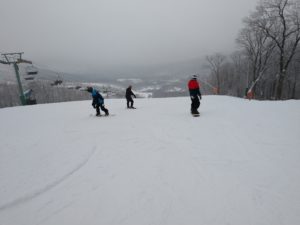The Economic Impacts of Climate Change Are Already Being Felt
Climate change is already having many different impacts. Birds are migrating earlier. Storms are more intense. Flooding is more common. In short, the planet is reacting to human-made carbon dioxide pollution being pumped into the atmosphere. But what about economic impacts from climate change? Are industries beginning to react to climate change?
Below we look at how four different industries are reacting to the impact climate change is having on their financial bottom lines.
First, we must note that this blog is not intended to prioritize the economic impacts of climate change over environmental and wildlife impacts. Rather, it is offered to provide encouragement to those who still need to be swayed to take climate change seriously. Perhaps readers of this blog might use some of this information to change the mind of a climate skeptic.
Economic Impact of Climate Change on the
Insurance Industry:
The insurance industry must prepare for climate change to avoid taking tremendous financial losses. Hurricane, wildfire and flood damage can devastate an insurer. For this reason, insurance companies are treating climate change as a real and significant threat.
In July 2018, the International Association of Insurance Supervisors released a white paper on the risk that climate change is presenting (present tense!) to the insurance industry. The paper cites the tremendous losses by the industry in 2017 -US$340 billion, the second-highest loss rate on record. The paper notes that this loss rate “draw(s) attention to a clear insurance gap for weather-related losses.”
An article in the Wall Street Journal outlines how some insurers have already taken note of these changes. Munich Re has noted that hailstorms have become more damaging in Central Europe. A company spokesman states: “We believe there is a strong indication that climate change is a driver of this trend.” Allianz, one of the largest insures in the world, sold its interest in a US-based insurance company in part because of the increased risk of flooding to coastal homes in California and Florida. While discussing the enhanced risk from weather due to climate change, Mr. Junaid Seria, the head of catastrophe-model research and development at ScorSE notes: “There’s a cost for inaction.”
Related Blog by Chris Pupke: NYC’s Creative Solution for Clean Water
Economic Impact of Climate Change on the
Real Estate Industry:

Sea level rise and increased coastal flooding are hitting Dorchester County Maryland especially hard. The low lying land of western portion of Dorchester County, along the shores of the Chesapeake Bay, has left residents with few options. Some have left, abandoning homes. Others have chosen to elevate their homes in a long term losing battle. The real estate industry is beginning to recognize the negative impact that climate change is having on real estate values. Photo courtesy of Chris Pupke.
The real estate industry is also beginning to see the economic impact of climate change. Research published in April of 2018 concluded that the value of low lying real estate in Miami-Dade County Florida was negatively impacted by coastal flooding caused by climate change. The authors coin a new term of “climate gentrification” which is the result of higher property values for real estate in higher elevation locations which is less prone to flooding.
A study by Frist Street Foundation looked into the impact that flooding had on sales prices in 17 states over 12 years. 13.3 million real estate sales were reviewed. The conclusion was that areas that flood were appreciating at a slower rate compared to areas that do not flood. This gap resulted in an estimated loss of $15.8 billion in expected appreciation.
Economic Impact of Climate Change on the Ski Industry:
Few industries experience the impact of climate change more directly than the ski industry. As the planet warms, the ski season shortens leading to a reduction of income for businesses associated with skiing (including ski resorts, equipment manufacturers and retailers, hotels and restaurants). One study states that tens of millions of ski trips could be lost in the United States alone by 2050 due to a reduced ski season length as a result of climate change. One model in the study showed a loss of $5.5 billion because of climate change.

Trouble on the slopes: Climate change is hitting the ski industry particularly hard as warmer temperatures shorten the length of the ski season. The industry is making pleas to snow lovers to lobby elected officials to take the threat of climate change seriously and to demand solutions be implemented. Photo courtesy of Chris Pupke.
To counteract this looming loss of income, the ski industry is proactively fighting climate change. The industry’s trade association, Snowsports Industries America (SIA), is leading a two-pronged approach that emphasizes research and lobbying. The SIA is lobbying for the passage of “comprehensive and bipartisan climate legislation in Congress that results in broad-scale carbon emission reductions, promotes energy innovation and supports the transition to a clean energy economy.”
Aspen-Snowmass, a major ski resort company, pleas with skiing fans to make their voice heard with their elected officials. On its website, the company encourages fans to “call out the skeptics and deniers and tell them that you want leaders who will fight for a stable climate and snowy winters, or thank our climate champions and encourage them to keep up the good fight.”
Economic Impact of Climate Change on the
Agriculture Industry:
The agriculture industry is reacting to climate change. While many farmers remain climate skeptics, the science is clear and the threat real: climate change will alter farming techniques in the coming decades. Farmers on the border of the High Plains in the United States have begun to stop planting corn as the hot dry weather moves eastward.
One report from Purdue University on agriculture in the state of Indiana states: “Changes to the state’s climate over the coming decades, including increasing temperatures, changes in precipitation amounts and patterns, and rising levels of carbon dioxide in the air will result in several direct and indirect impacts to the state’s agricultural industry.” Among the key findings in the report are: 1) warmer nighttime temperatures have already begun to reduce corn yields; 2) water deficits are expected to reduce corn yields by as much as 20% over the next thirty years; 3) wet spring weather will reduce the length of the early planting season; 4) apple trees, peach trees and grape vines will be more vulnerable to killing frosts after bud emergence; 5) livestock will suffer under higher temperatures; 6) soil nutrients may decease due to increased water flows from more rain fall and increased rates of soil organic matter decomposing due to higher temperatures; and 7) warmer and wetter weather is expected to lead to increased weed, pest and disease pressure.
A 2017 study by an international panel of researchers published in the Proceedings of the National Academy of Sciences of the United States of America concludes that “agriculture production is vulnerable to climate change.” If we fail to address climate change, the study states that crop yields are expected drop for wheat (6%), rice 3.2%, corn (7.4%) and soybean (3.1%) for each degree Celsius that temperatures rise.
Related Blog: Dragonflies — Important Environmental Indicators
Dr. William Happer:
So, what does Dr. William Happer think of climate change and the need to prepare for its impacts? Happer claims that the “demonization of CO2… differs little from the Nazi persecution of the Jews, the Soviet extermination of class enemies or ISL slaughter of infidels.”
Happer is the Cyrus Fogg Brackett Professor of Physics, Emeritus, at Princeton University. One may wonder why this piece includes a quote from a professor of physics who, according to his Wikipedia page, “has no formal training in climate science.”
Alas this minor detail did not deter Donald Trump from preparing to nominate Happer to chair the proposed “Presidential Committee on Climate Security”.
Biophilia Helping Wildlife Fight Climate Change:
Sadly, climate change is having an even greater impact on our wildlife populations than it is having on our economy. A 2018 report from the Intergovernmental Science-Policy Platform on Biodiversity and Ecosystem Services states that climate change is one of the top threats to biodiversity.
Biophilia Foundation is partnering with groups across the continent to restore and protect habitat for wildlife. In addition to the wildlife benefits, this habitat can also help mitigate the negative impacts of climate change. Please help us support these organizations that help wildlife and fight climate change.
Sources:
https://www.aspensnowmass.com/inside-aspen-snowmass/give-a-flake
Bowling, Laura C. et. al. “Indiana’s Agriculture in a Changing Climate: A Report From the Climate Change Impacts Assessment”. Purdue University. 2018.
International Association of Insurance Supervisors. “Issues Paper on Climate Change Risks to the Insurance Sector.” Moscow, Russia. July 31, 2018.
Keenan, Jesse M., Thomas Hill and Anurag Gumbar. “Climate Gentrification: From Theory To Empiricism in Miami-Dade County, Florida. IOP Publishing Ltd. April 23, 2018.
https://www.marketplace.org/2018/12/27/business/age-climate-change-farmers-weigh-options-future
http://www.nsaa.org/environment/outdoor-business-climate-partnership/
http://www.pnas.org/content/114/35/9326
https://www.scientificamerican.com/article/climate-change-is-becoming-a-top-threat-to-biodiversity/
https://theslot.jezebel.com/possible-trump-science-advisor-compares-climate-science-1793497686
https://www.vox.com/2019/2/20/18233378/william-happer-trump-climate-change-panel
https://en.wikipedia.org/wiki/William_Happer
https://www.wsj.com/graphics/climate-change-forcing-insurance-industry-recalculate/
Wobus, Cameron et. al. “Projected Climate Change Impacts On Skiing And Snowmobiling: A Case Study of the United States”. Global Environmental Change, Vol. 45, pages 1-14. July 2017.

Recent Comments